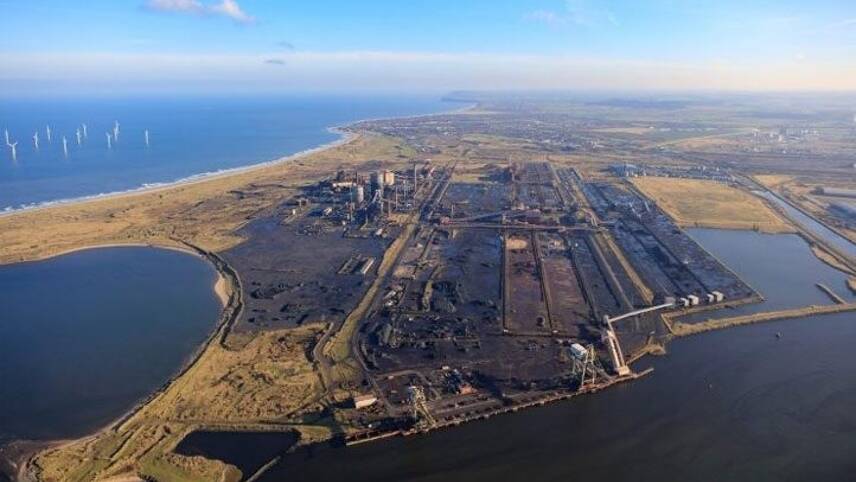Register for free and continue reading
Join our growing army of changemakers and get unlimited access to our premium content

Pictured: The Teesworks industrial zone on Teesside - the proposed site for BP's projects. Image: BP
Saudi-based renewables and manufacturing firm alfanar has confirmed plans to roll out a series of green project investments across the UK, stating that the overall price would create a “multi-billion pound” bonanza for low-carbon solutions.
The first of these investments is the £1bn Lighthouse Green Fuels waste-to-SAF plant, which entered the FEED (Front End Engineering Design) phase in June. alfanar has awarded the contract for the plant, to be located in the Teesside industrial cluster, to Worley.
According to alfanar, the project will convert one million tonnes of household and commercial waste into 180 million litres of SAF annually, the equivalent of fuelling more than 15,000 short-haul flights a year.
SAF has proven to be a popular approach to decarbonisation for the aviation industry, which is responsible for 3% of annual global emissions and which – pandemic aside – had been growing rapidly in terms of passenger numbers and emissions for a decade.
It is doubtless so popular because using blends of 50% is a ‘drop-in’ solution, requiring no changes to aircraft – as would be necessary for electrification or the use of hydrogen. The UK’s industry body for sustainability in aviation is planning to prioritise SAF use, efficiencies and offsetting to reach net-zero, and this approach has influenced national policymaking on the issue.
However, SAFs remain a controversial approach to decarbonisation, especially when it interrelated with waste treatment.
alfanar’s chief investment officer Mishal Almutlaq said: “With the third-largest aviation network in the world, and with one of the world’s largest potential offshore CO2 stores, the UK has the industrial and geological advantages to become a global leader in developing green aviation fuel with the lowest possible emissions using CCS technology. That is why we want to build our first-ever SAF plant in the UK by 2027 and two further plants by 2035.
“To deliver net-zero aviation, the Government has already established the Jet Zero Council, has announced grant funding for SAF projects, and is consulting on a Jet Zero Strategy. To continue this leadership, and to enable alfanar’s first SAF project and other similar early projects to progress, price certainty is also needed. We are therefore today calling on the UK Government to progress the SAF mandate and introduce a price stabilisation mechanism such as a Contract for Difference for SAF.”
The SAF plant will be located in Teesside’s net-zero industrial cluster, which is aiming to decarbonise in line with Government targets.
Under the UK’s net-zero ambition, the Government has committed to fully decarbonising at least one industrial cluster by 2040. This has spurred a race between clusters in the North West, Teesside, Humberside, Grangemouth, South Wales and Southampton to become the first to do so.
The Humberside and Teesside projects have leveraged their knowledge through a partnership that will develop net-zero carbon industrial clusters. These two regions account for nearly 50% of all UK industrial cluster emissions. Businesses in the regions are working collaboratively through the East Coast Cluster.
Net Zero Teesside and Zero Carbon Humber believe that the East Coast Cluster can capture, transport and store up to 27 million tonnes of carbon emissions annually by 2030. The Cluster could also support an average of more than 25,000 jobs each year between 2023 and 2050.
Alfanar also claims that it is “actively evaluating” potential sites across the UK for a second and third SAF plant to be built by 2030 and 2035 respectively.
Aviation Minister Robert Courts MP said: “Aviation will be central to our future growth, so it’s essential we deliver greener flying. Thanks to alfanar’s investment the UK could be producing cleaner fuel in a few years, not only making us more sustainable, but also creating more jobs and strengthening our economy.”
The announcement comes as the UK Government attempts to strengthen times with Saudi Arabia and the United Arab Emirates, partly in a bid to cut the dependence on Russian gas imports. However, many charities are pointing to cases of human rights abuses in those nations as reasons not to pursue new trade deals.
However, the UAE has already invested upwards of £3bn in science and technology in the UK through the Sovereign Investment Partnership.


No such thing as “sustainable aviation fuel”. It uses material that would otherwise be burned for other purposes, so those have to be replaced by other, fossil fuels. You just shift CO2 emissions from one purpose – flying – to others.